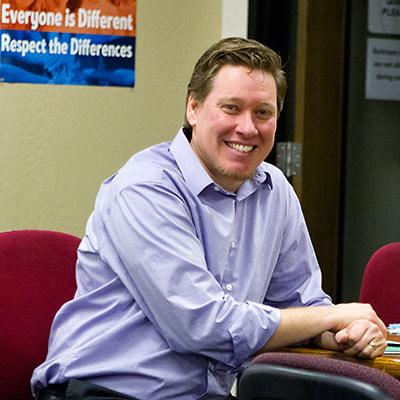
Travis Sharpe, Coordinator of CareerConnect at Truckee Meadows Community College
Students with a disability of any kind, or previous physical injury can receive extra support toward academic and career success at CareerConnect, a program at Truckee Meadows Community College. The service began during Spring Semester 2015; it's now reaching out to share more of its success and processes with faculty, and soon will hold a new career seminar.
“We welcome all TMCC staff members to come visit CareerConnect in Red Mountain Building, room 115, and ask questions or refer a student,” said Travis Sharpe, Coordinator of CareerConnect. “I think the involvement of more faculty and staff is a great partnership.”
A first-ever career seminar is scheduled for June.
“We’re offering a three-week career-readiness workshop at the Meadowood Center for CareerConnect participants to learn more soft skills, resume writing and practical skills in filling out online job applications,” he said. “Our hope is that a student will get at least one interview as a direct result of this workshop.”
CareerConnect is currently offered only at TMCC and Western Nevada College (WNC). The program is a collaboration between TMCC and the Bureau of Vocational Rehabilitation (BVR), a branch of the Nevada Department of Employment, Training and Rehabilitation (DETR). The BVR is under the umbrella of DETR, and is designed to help people with disabilities.
The original grant period was three years, starting in Spring Semester 2015.
“The Bureau has asked us to update the grant contract for four more years because they like what we’re doing and they see it as a good partnership,” Sharpe said. “Because of the program’s success, they’re expanding the program to work with UNLV, as well.”
The Bureau of Vocational Rehabilitation is a resource for students
“We advocate and build a rapport with BVR," Sharpe said. "There’s a better line of communication as a result of this partnership, and that helps to provide a better service for students.”
The agency also helps students with costs of materials.
“Voc-rehab sometimes can help students with the cost of books, supplies and gear,” Sharpe said. “Also, we request faculty to give progress reports on our participating students, which really helps monitor and support the students’ success and development.”
How do students enroll in the program?
“We’re about connecting our students with existing resources here at TMCC — we’re providing enhanced services to support student retention and completion and eventual employment,” Sharpe said.
There are two ways that students enter CareerConnect. One way is through the BVR, where a person who is already meeting with a vocational counselor is referred to TMCC for more career development or job training. The other entry for students is from registration at the Disability Resource Center (DRC) at TMCC. Registered DRC students are directed to the BVR for advisement, and then are able to enter CareerConnect.
“We teach self-advocacy — preparing them for the real world, knowing how to talk about or explain their disability to an employer and ask for accommodations that enable them to be most productive,” he said. “Employers sometimes simply do not know how to make a desk more wheelchair-friendly or how to adjust a computer for those with visual impairment.”
Sharpe and the CareerConnect staff work with students at the Dandini Campus and at three satellite locations — the Applied Technology Center, Meadowood Center and the William N. Pennington Health Science Center. Staff meet with students once a month, or more as needed. They are the first point of contact when things come up, whether it’s about questions in the area of soft skills or even the need for counseling. The program is a resource hub, first connecting the students to resources at TMCC, and then to further resources in the community.
“By the time they leave our program, they are going to be work-ready,” Sharpe said. “After they finish their degree or certificate here, we follow them with career support services for 90 days of employment.”
People with disabilities in the workplace
The magazine, Careers & the disABLED, has published in its winter 2015/2016 edition some careers and the percent of those employed in these fields who also have a disability.
- Administrative Assistant: 4.8% in this career with a disability
- Computer Systems Analyst: 3.2%
- Counselor: 5.5%
- General and Operations Manager: 3.6%
- Management Consultant: 18.6%
- Medical Records Technician: 26.4%
- Pharmacy Technician: 5.4%
- Registered Nurse: 3.5%
- Social Worker: 5.2%
- Teacher: 3.2% K-12, and 3.9% Post-secondary
The full report can be viewed on the CareerCast website.
Swetha Machanavajhala is a software engineer at Microsoft who said in Careers & the disABLED that her company is a great place to work for someone with a disability. Machanavajhala, who has profound hearing loss, found a thriving career as a software engineer at Microsoft and said in the article that the company provides as many accommodations as needed to help people with disabilities be productive and happy, even taking technical and leadership positions.
TMCC has been a welcoming community
“We’re happy to be part of the TMCC community — everyone here is so great,” Sharpe said. “It’s great to be part of a staff that is so passionate about what they do, the mission of the college and helping students.”
He gives credit to Joan Steinman, Ed.D., Director of Retention and Support Services, for initiating the grant and resulting program.
“What the big success is … is the foresight, the understanding that Joan Steinman had in seeing the need and the possibility for this program here at TMCC,” he said.
For more information about CareerConnect, please contact Travis Sharpe at 775-673-7277.






